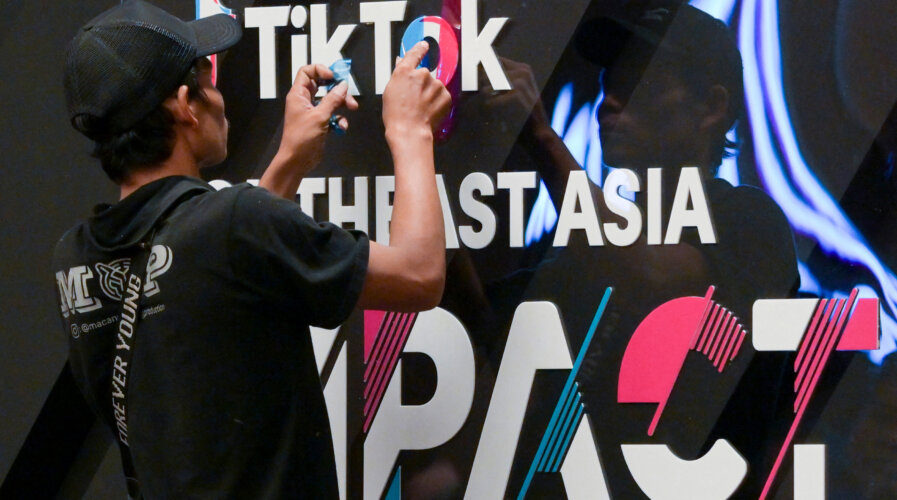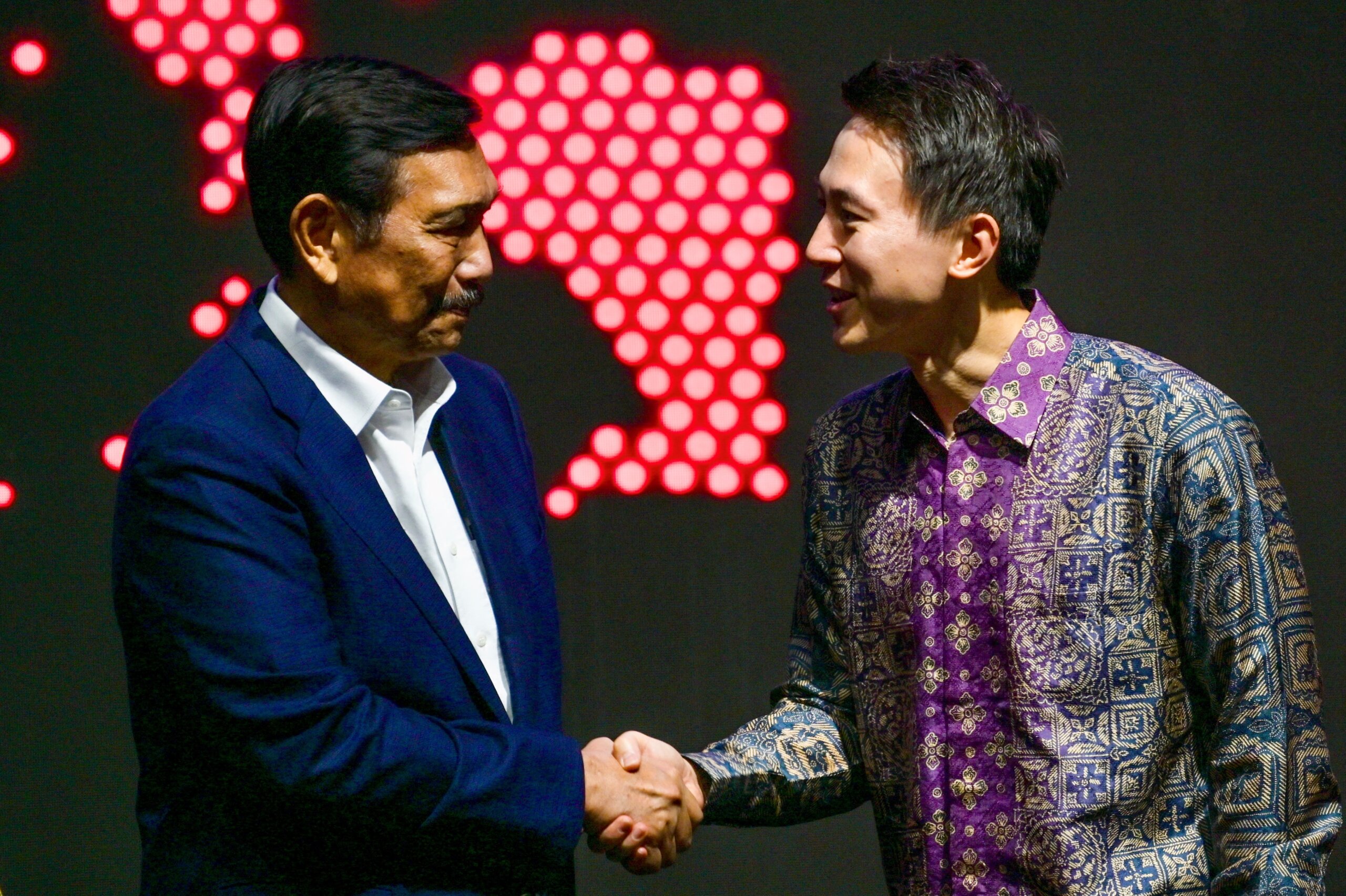
This picture taken on June 15, 2023 shows a worker finishing signage before the TikTok Southeast Asia Impact Forum 2023 in Jakarta. Indonesia has banned goods transactions on social media platforms in a new regulation, its trade minister said on September 27, as Jakarta aims to rein in direct sales on major platforms it says are harming millions of small businesses. (Photo by BAY ISMOYO / AFP)
The end of TikTok Shop and other social commerce in Indonesia
- The move by the government of Indonesia is a big blow to TikTok Shop as the video platform giant has been banking on the nation to grow its e-commerce business.
- Social commerce platforms would have a week to comply with the new rule or risk revoking their license.
Three months ago, the CEO of TikTok, from being grilled by US lawmakers, pledged that his ByteDance-owned video-sharing platform would invest billions of dollars in Indonesia and Southeast Asia over the next few years. At a forum in Jakarta in June, Shou Zi Chew revealed that Indonesians make up more than one-third of TikTok’s 325 million Southeast Asian users every month, and more than two million are selling on TikTok Shop.
What Shou meant was that Southeast Asia is TikTok’s biggest market in terms of users, and Indonesia, the region’s biggest economy and most populous nation, is the most significant market for the platform. So much so that Indonesia was the first to pilot the app’s e-commerce arm. TikTok Shop, in a country of 278 million, was supposed to be a template for a global expansion from the US to Europe.

TikTok CEO Shou Zi Chew (R) shakes hands with Indonesian Coordinating Minister for Maritime Affairs and Investment Luhut Binsar Pandjaitan during the TikTok Southeast Asia Impact Forum 2023 in Jakarta on June 15, 2023. (Photo by BAY ISMOYO / AFP)
Unfortunately, TikTok’s e-commerce thrust has been stalled rather abruptly in Indonesia by the local government in an attempt to defend offline merchants, marketplaces, and small enterprises. In an unprecedented ruling that came into force this week, TikTok, or any social media platform, is compelled to split payments from shopping platforms or risk having their licenses revoked.
In short, the Indonesian government only allows social media to facilitate promotions, not transactions. “Social media [and e-commerce] must be separated so that the algorithms are not controlled. The provision will prevent using personal data for business purposes,” Minister of Trade Zulkifli Hassan said. Hassan also told a news conference that social commerce platforms would have a week to comply with the new rule.
So far, TikTok is the only social media company allowing for direct transactions and product promotions on their platforms. For Hasan and a handful of other ministers within the government, including the country’s president, predatory pricing on social media platforms endangers the livelihoods of SMEs struggling to compete.
According to a local media report quoting the Director General of Public Information and Communications of the Ministry of Communications and Informatics, Usman Kansong, Tiktok Indonesia has two permits from his ministry. “There are two permits: social media and e-commerce. “But with Minister of Trade Regulation No. 31 of 2023, Tiktok must separate social media from e-commerce,” he added.
Usman reportedly told reporters that if Tiktok Indonesia separates itself from TikTok Shop and registers the latter as a separate entity, it can be business as usual for the e-commerce platform. TikTok, as envisioned, is unhappy with the new ruling.
It argues that separating social media and e-commerce hampers innovation and hurts millions of merchants and consumers. The company says some rely on its platform to make a living and that all its sellers are Indonesian or have local entities. For TikTok, the fresh restrictions in Indonesia open a new front in the platform’s fight with regulators worldwide.
Concurrently, TikTok has not been on the good books of the US, Europe, and India, mainly on national security concerns. Perhaps, for TikTok in Indonesia, navigating the conflict will be pivotal for the platform as other governments assess closely. For now, TikTok’s goal to grow its e-commerce business is facing its most significant stumbling block yet because of the significance of Indonesia as a market for the company.
By the end of 2022, TikTok Shop had become the fifth-largest e-commerce platform in Indonesia, according to data from Singapore-based venture outfit Momentum Works. Last year, the country represented 42% of TikTok’s US$4.4 billion regional gross merchandise value (GMV).
Bloomberg Intelligence’s analyst, Nathan Naidu, believes TikTok’s possible split of e-commerce and social media operations in Indonesia could impede further conversion of its 125 million local monthly active users (MAU) into shoppers, benefiting Sea’s Shopee, which, like TikTok Shop, relies on beauty and personal care for most of its domestic sales.
“GoTo’s Tokopedia, which had 34 million MAU in August vs. Shopee’s 138 million and Alibaba-owned Lazada’s 37 million, should be better able to defend its GMV share in Indonesia, which drove 90% of the group’s 2022 sales,” Naidu added. Meanwhile, Jianggan Li, CEO of Momentum Works, noted in an e-mail that Shopee has been voicing their support for Indonesian MSME exports yearly.
“Banning TikTok Shop could be operationally messy (and many of our friends say impractical). There are many different permutations of how things can evolve (e.g., a separate e-commerce app or specific programs for MSMEs). Regardless of how the ban proceeds, TikTok’s vast consumer traffic will continue to be harvested for e-commerce, through TikTok Shop or other means, by TikTok or by other parties,” he noted
Li also believes it is not too late for TikTok to engage and turn the tide. He suggests that TikTok needs to adopt a bold and localized approach.
READ MORE
- 3 Steps to Successfully Automate Copilot for Microsoft 365 Implementation
- Trustworthy AI – the Promise of Enterprise-Friendly Generative Machine Learning with Dell and NVIDIA
- Strategies for Democratizing GenAI
- The criticality of endpoint management in cybersecurity and operations
- Ethical AI: The renewed importance of safeguarding data and customer privacy in Generative AI applications


